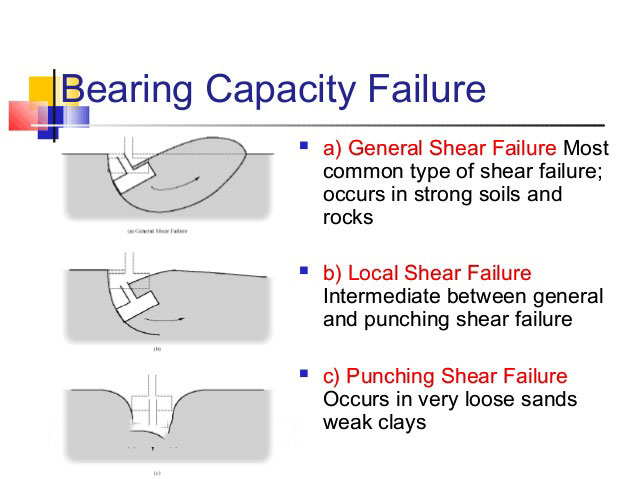
Reasons for failure of bearing capacity on foundation
Foundation failure occurs due to variation on the load:
There exist three types of shear failure, i.e. General, Local and Punching shear failures which happened due to the compactness of soil and depth of footing with regard to its breadth (i.e D/B Ratio). When the utmost bearing capacity of the soil is attained, it may fail in one of the following three failure type on the basis of the type of soil and depth to width ratio of the footing. A foundation can collapse in the following three diverse ways under loads :
Punching shear failure of foundation
General Shear Failure of foundation
Local shear failure of foundation
The above three types of foundation failure should be examined throughout design phase of concrete foundation for the specified load. Directives obtained through standard codes of practice should be obeyed so that foundation does not fail in any of the failure types as stated under any probable load combinations when structure is in use.
1.General Shear Failure
- Under this type, the footing moves downward slightly and thus forms completely plastic zones and a sudden failure occurs with a significant bulging of the ground surface alongside the footing
- It is based on clear-cut failure pattern, that comprised of a wedge and slip surface and bulging (heaving) of soil surface alongside the footing
- Sudden collapse happens, together with tilting of the footing
- This type of failure happens provided that dense sand or stiff cohesive soil support the footing
- Failure load is apparent
- The load-settlement diagram is equivalent to stress-strain for solid sand or over-consolidated clay
- The ultimate load is apparent on this curve.
2. Local shear Failure:
Failure pattern comprises of wedge and slip surface but is transparent only under the footing. Slight bulging of soil surface takes place. Tilting of footing is not necessary.
- In this mode a large deformation takes place under the footing prior to the formation of failure zones, i.e. large vertical settlement occurs prior to slight bulging of the ground surface
- Tilting of footing is not necessary
- Ultimate load is not clear
- It occurs in moderately compressible soils or loose sand i.e occurs in soil of high compactness
- Yielding occurs adjacent to the lower edges of the footing
- Various yield developments may happen together with settlement in a series of jerks
- The bearing pressure at which the first yield occurs is assigned as the first-failure pressure or first failure load

To read the complete article, go through the following link
www.civilnarch.com

